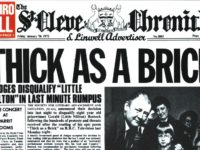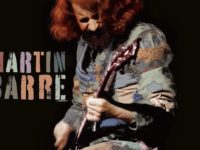Beginning with a wistful blues then charging forward with a brilliantly contained moxie, Jethro Tull’s “Locomotive Breath” doesn’t at first present as this eerily impellent message song — much less the seminal moment for an underutilized woodwind instrument. But that’s exactly what this is.
And it’s a good thing, too.
After all, “Locomotive Breath,” a chillingly prophetic indictment of over population (it was released, after all, this week back in 1971 as part of Aqualung), risked getting lost on an album that’s simply bursting with strange, forgotten, sometimes unsavory characters (not least of which is the leering homeless man of its title track) and blunt questions about faith and its earthly trappings (“My God,” and the closing “Wind Up”).
True, “Locomotive Breath” boasts a chugging, metallic riff, added by band leader Ian Anderson himself to mimic the passing of a night train — unusual on Aqualung, a largely acoustic prog-rock album. But even that had been a staple for Jethro Tull. There’s not much to differentiate “Locomotive Breath” from a trio of respectable, though largely uninteresting blues rock-influenced albums Anderson and Co. produced over the previous three years.
At least, not at first. The song is building, though — relentlessly, improbably — towards popular music’s most distinctive flute solo. Seriously. Anderson completely rocks an aerophone on this one. In a year that saw the release of prog classics like Fragile from Yes, Tarkus by Emerson Lake and Palmer and Nursery Cryme by Genesis, the flute (even more than the flautist himself, leaping around like a beardy, garden gnome) was this curiously involving, out-of-nowhere delight.
Of course, the presence of that very woodwind made Jethro Tull’s eventual winning of the first-ever heavy metal Grammy in 1989 all the more curious. If anything, this band, back in the day, could’ve rightly be called a more commercial version of Frank Zappa’s Mothers of Invention. Really, other than that brief moment of dizzying release from Anderson on the flute, “Locomotive Breath” boasts a coiled sense of looming menace. It’s not really loud at all.
I used to credit drummer Clive Bunker, recording his last album with Jethro Tull, for holding this shuddering beast together — only, it turns out, Anderson provided the basic rhythm track for “Locomotive Breath” too, putting down high-hat and bass drums in the echo-filled Island Records studio on London’s Basing Street in December of 1970.
As coherent as “Locomotive Breath” has always seemed — like the most successful synthesis yet of Jethro Tull’s combination of blues rock, madrigal whimsy and prog — the song was actually pieced together, element by element, from Anderson’s rough draft. John Evan put in some piano, then Bunker added toms and cymbals and, finally, guitarist Martin Barre contributed a lead solo. The intro was tacked on later. It was, in the end, a canny (and again fairly prescient) bit of studio trickery, with single members adding their bits while Jethro Tull itself was never all together in the same room at the same time.
Yet from these disparate pieces emerged a capstone moment for Jethro Tull, this nasty, propulsive grumble — as un-liturgical as it was groovy. Oh, and with a best-ever (not that the list in rock is very long) solo on the flute. Seriously.
- How Deep Cuts on ‘Music From Big Pink’ Underscore the Band’s Triumph - July 31, 2023
- How ‘Islands’ Signaled the Sad End of the Band’s Five-Man Edition - March 15, 2022
- The Band’s ‘Christmas Must Be Tonight’ Remains an Unjustly Overlooked Holiday Classic - December 25, 2016




